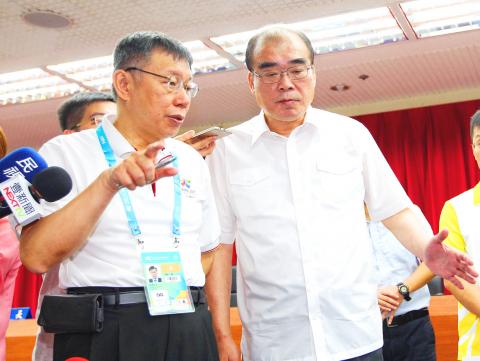Security for the closing ceremony of the Taipei Summer Universiade on Wednesday is to be increased to include a more robust allocation of personnel to ensure the safety of athletes, an official said yesterday.
Police have received information indicating that groups protesting pension reform plan to stage a demonstration at the event, said the official, who declined to be named, adding that divisional commanders are reviewing security personnel allocation at the venue.
While the groups have claimed that they were not responsible for violence outside the Taipei Municipal Stadium during the opening ceremony of the Universiade on Saturday last week, police have identified the individuals who allegedly hit police and threw a smoke bomb as pension reform protesters.

Photo: CNA
Minister of the Interior Yeh Jiunn-rong (葉俊榮), Deputy Minister of the Interior Chiu Chang-yueh (邱昌嶽) and National Police Agency Director-General Chen Kuo-en (陳國恩) are to preside at a National Policy Agency central safety command center, commanded by Yeh, during the closing ceremony and keep in close contact with the Taipei Police Department, the official said.
Throughout the Universiade, about 7,000 security personnel — approximately 6,000 police officers and 1,000 students from the Taiwan Police College and the Central Police University — have een deployed at venues every day, but the security forces are to be increased to more than 10,000 for the closing ceremony, the official added.
Security personnel are to be tasked with strictly enforcing the law and removing protesters to ensure the safety of athletes and attendees, the official said, adding that Vice President Chen Chien-jen (陳建仁) is scheduled to attend the event.
The information received by the police also indicates that dozens of other groups are planning to protest at the closing ceremony, including pro-unification, pro-independence and civic groups, the official said.
Premier Lin Chuan (林全) at a meeting on Thursday instructed Yeh to supervise the security for the closing ceremony.
Asked whether that directive meant a heightened security level, Lin said the Taipei City Government is in charge of security for the Universiade, while establishing the control center with Yeh in command is a demonstration of the central government’s support and assistance to the city government.
Separately yesterday, Taipei Mayor Ko Wen-je (柯文哲) said security preparations for the closing ceremony have been discussed, but as more intelligence has been gathered, another meeting is to be held tomorrow to finalize plans.
Asked whether the city government knows which groups plan to protest at the event, Ko said various groups have expressed their intention to protest, but the police would communicate with some of them beforehand.
Asked about the possible establishment of a special demonstration area outside the venue and whether a buffer zone separating attendees and protesters would be widened, Ko said he has discussed the issues with Taipei Police Department Commissioner Chiu Feng-kuang (邱豐光) and a final decision is to be made tomorrow.
Regarding whether barricades are to be employed, Ko said: “Why should I tell you our security plans?”
However, he added that such a measure has been considered, but would hopefully not be necessary.
Additional reporting by Shen Pei-yao

Right-wing political scientist Laura Fernandez on Sunday won Costa Rica’s presidential election by a landslide, after promising to crack down on rising violence linked to the cocaine trade. Fernandez’s nearest rival, economist Alvaro Ramos, conceded defeat as results showed the ruling party far exceeding the threshold of 40 percent needed to avoid a runoff. With 94 percent of polling stations counted, the political heir of outgoing Costa Rican President Rodrigo Chaves had captured 48.3 percent of the vote compared with Ramos’ 33.4 percent, the Supreme Electoral Tribunal said. As soon as the first results were announced, members of Fernandez’s Sovereign People’s Party

EMERGING FIELDS: The Chinese president said that the two countries would explore cooperation in green technology, the digital economy and artificial intelligence Chinese President Xi Jinping (習近平) yesterday called for an “equal and orderly multipolar world” in the face of “unilateral bullying,” in an apparent jab at the US. Xi was speaking during talks in Beijing with Uruguayan President Yamandu Orsi, the first South American leader to visit China since US special forces captured then-Venezuelan president Nicolas Maduro last month — an operation that Beijing condemned as a violation of sovereignty. Orsi follows a slew of leaders to have visited China seeking to boost ties with the world’s second-largest economy to hedge against US President Donald Trump’s increasingly unpredictable administration. “The international situation is fraught

MORE RESPONSIBILITY: Draftees would be expected to fight alongside professional soldiers, likely requiring the transformation of some training brigades into combat units The armed forces are to start incorporating new conscripts into combined arms brigades this year to enhance combat readiness, the Executive Yuan’s latest policy report said. The new policy would affect Taiwanese men entering the military for their compulsory service, which was extended to one year under reforms by then-president Tsai Ing-wen (蔡英文) in 2022. The conscripts would be trained to operate machine guns, uncrewed aerial vehicles, anti-tank guided missile launchers and Stinger air defense systems, the report said, adding that the basic training would be lengthened to eight weeks. After basic training, conscripts would be sorted into infantry battalions that would take

GROWING AMBITIONS: The scale and tempo of the operations show that the Strait has become the core theater for China to expand its security interests, the report said Chinese military aircraft incursions around Taiwan have surged nearly 15-fold over the past five years, according to a report released yesterday by the Democratic Progressive Party’s (DPP) Department of China Affairs. Sorties in the Taiwan Strait were previously irregular, totaling 380 in 2020, but have since evolved into routine operations, the report showed. “This demonstrates that the Taiwan Strait has become both the starting point and testing ground for Beijing’s expansionist ambitions,” it said. Driven by military expansionism, China is systematically pursuing actions aimed at altering the regional “status quo,” the department said, adding that Taiwan represents the most critical link in China’s